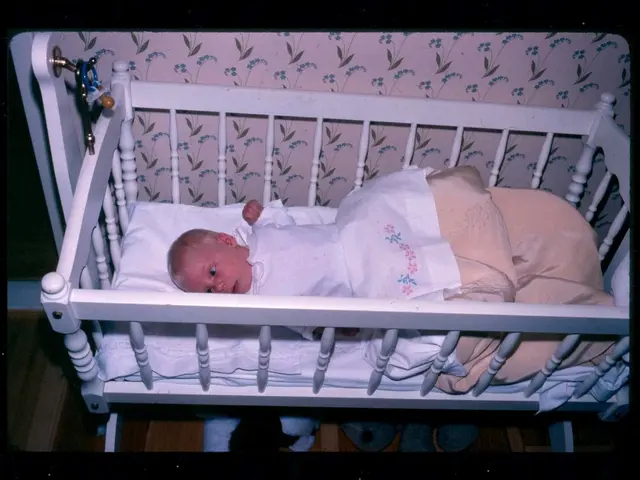Increase in Depressions: "As in Empty Space" (paraphrased)
Not all sunshine and rainbows, that's for sure. Not a bed of roses or a walk in the park. When you're grappling with depression, everyday life can be a struggle. It's like living in a void, devoid of feelings, with no sense of purpose. And in Hamburg, the city's reached a record high in depression cases. Around 13.5% of Hamburgers and Hambergerinnen were diagnosed with depression in 2022 - that's over 227,000 people. The health insurance provider AOK shared this info in their recently published "Health Atlas Depression."
For folks who've never suffered from depression, it's often misunderstood as just being really sad. But depression is a much broader spectrum, according to the ICD-10, the International Classification of Diseases used by the World Health Organization (WHO). Alongside feelings of hopelessness, those with depression also experience decreased energy and interest, lower levels of pleasure and concentration, and can experience extreme fatigue after even minor efforts. Other symptoms can include sleep and appetite changes, loss of libido, and weight loss. Depression is divided into mild, moderate, and severe episodes.
Everything feels Heavy
Hanne (33), a teaching student from Hamburg, knows this all too well. She's battled several depressive episodes throughout her life. And overcame them. In 2017, she was first diagnosed with a severe depression. "A depression unfolds in phases where I rarely felt deep emotions like happiness or sadness. It's like an empty space," she says. "A sense of purpose for life is hard to find during these times. Everything feels heavy."
Women face more stressors
Surprisingly, depression in children between the ages of 10 and 14 is rare, according to the AOK Health Atlas. But in all age groups, women are more likely to be affected, with a prevalence rate of 16.4%, compared to men at 10.4%. Potential reasons for this could involve hormonal factors, or the possibility that women face more stressors in their lives that contribute to depression.
People with depression often struggle to manage their daily lives. Mental health issues were the third most common reason for people being unable to work in 2023, accounting for 16.1% of cases. People chronically affected by depression tend to spend significantly more time away from work compared to those suffering from other illnesses. The AOK Health Atlas reported that the average absence in Hamburg was 44 days in 2022. Hanne also had trouble keeping up with her daily routines when she was experiencing a depressive episode. "Getting out of bed in the morning feels like climbing a mountain," she says. "Followed by showering, grocery shopping, cooking, and eating. You have to force yourself to do the bare minimum."
Suddenly a Bad Person
While public awareness of mental health issues has grown over the years, people with depression still face prejudices and stigma, even after recovery. "After recovering from a deep depression, it happened that a normal bad day was instantly ascribed to my depression," Hanne remembers. "I was also discriminated against based on my behavior due to depression. When outsiders don't know about it, people are quick to judge: as a bad friend, lazy, irresponsible to herself and others, or as unreliable."
The System Fails
Quick help in the form of psychotherapy is crucial when dealing with depression. Unfortunately, this is often denied to those in need. In 2022, over half of those seeking psychotherapy had to wait more than a month for their first consultation. This initial consultation doesn't guarantee therapy. After the first consultation, therapists may recommend further treatment based on need. Often, the therapy they prescribe isn't available in their own practice due to lack of capacity, leaving patients frustrated and despondent. Waiting lists can be long. At the University Clinic Eppendorf (UKE), up to 50 people could be waiting for a hospital bed, says Dr. Gregor Leicht, a senior physician at the UKE. The telephone inquiries are also high, he adds. Hanne found a suitable therapy place in 2017 after nearly three months of searching, but her loved ones were quick to inform her about the long waiting times: "Sometimes friends waited over a year for a call-back or confirmation."
What to do when it Gets Bad?
In the event of an emergency, such as suicidal thoughts, immediate help should be sought. This can often be done by visiting a psychiatric clinic’s emergency department. For other cases, regular appointments should be made with general practitioners or mental health specialists during the waiting period. "It's advisable to start searching for a psychotherapy place as soon as possible, as supply often lags behind demand," Leicht says. "Another option is to utilize digital mental health apps, which are approved for treating depression and often covered by insurance." Hanne managed to find help when she needed it. Many others haven't.
Emergency Contact numbers include:
- Telephone Counseling: 0800 111 0 111
- Depression Information Line: 0800 334 4533
- Hamburg Crisis Telephone: 040 428 11 3000
- Names have been changed for privacy reasons.
Karoline Gebhardt
Karoline Gebhardt, born in 1994 in Reinbek, is a former state champion in archery, inspired by the film "Plötzlich Prinzessin." Today, she prefers watching Korean films with subtitles. At metal concerts, she crowdsurfs and has even made it onto the stage at the legendary Logo club. In her bachelor's, she studied Librarianship and Information Management. As a research assistant at the dpa, she researched disaster warnings for the app Nina. For "Szene Hamburg," she tested restaurants and crafted a kitchen knife for a report. Karoline is obsessed with quizzes and considers herself a Günther Jauch Ultra. Abbreviation: kar
- Mit Wohnungstausch gegen die Wohnkrise?
- Grabsteine mit Geschichten: Der Jüdische Friedhof in Altona
- Ein Tag an der Eliteschule des Sports
- Das Neue kommt, ob du willst oder nicht
Enrichment Data:
Depression: Understanding the Conditions and Its Impact on Daily Life
Depression is a complex mental health disorder that affects over 300 million people worldwide and is characterized by feelings of sadness, hopelessness, loss of interest or pleasure, changes in appetite or sleep patterns, and difficulty concentrating.
Gender Differences: Women and Depression
While depression can affect anyone, women are nearly twice as likely to experience depression than men. Factors contributing to the gender difference include biological, hormonal, and social factors.
Barriers to Mental Health Services: Stigma and Waiting Lists in Hamburg
According to the Mental Health Atlas, Hamburg struggles with long waiting times for mental health services, with an average wait time of five weeks for psychotherapy appointments in 2018.Stigma against those suffering from mental health conditions can further exacerbate the problem, leading to people hiding their illness and not seeking help.
Coping Strategies: How to Navigate Daily Life with Depression
In addition to medical treatment, there are various strategies people can use to cope with depression and improve their daily lives, including practicing self-care, engaging in activities that bring pleasure, connecting with others, and seeking support from mental health professionals.
Digital Mental Health Solutions: An Emerging Trend in Mental Health Care
Digital mental health solutions, such as digital therapy and digital mental health apps, are growing in popularity as a way to provide mental health support to those in need. These solutions offer a convenient and accessible way to receive mental health support, particularly during the COVID-19 pandemic.
- Hanne's battle with depression is not an isolated case, as it falls under the broad spectrum defined by the ICD-10, the International Classification of Diseases used by the World Health Organization (WHO). Alongside feelings of hopelessness, those with depression also experience decreased energy and interest, lower levels of pleasure and concentration, and can experience extreme fatigue after even minor efforts.
- Despite the importance of mental health, people with depression still face prejudices and stigma, even after recovery. "After recovering from a deep depression, it happened that a normal bad day was instantly ascribed to my depression," Hanne remembers. "I was also discriminated against based on my behavior due to depression. When outsiders don't know about it, people are quick to judge: as a bad friend, lazy, irresponsible to herself and others, or as unreliable."




